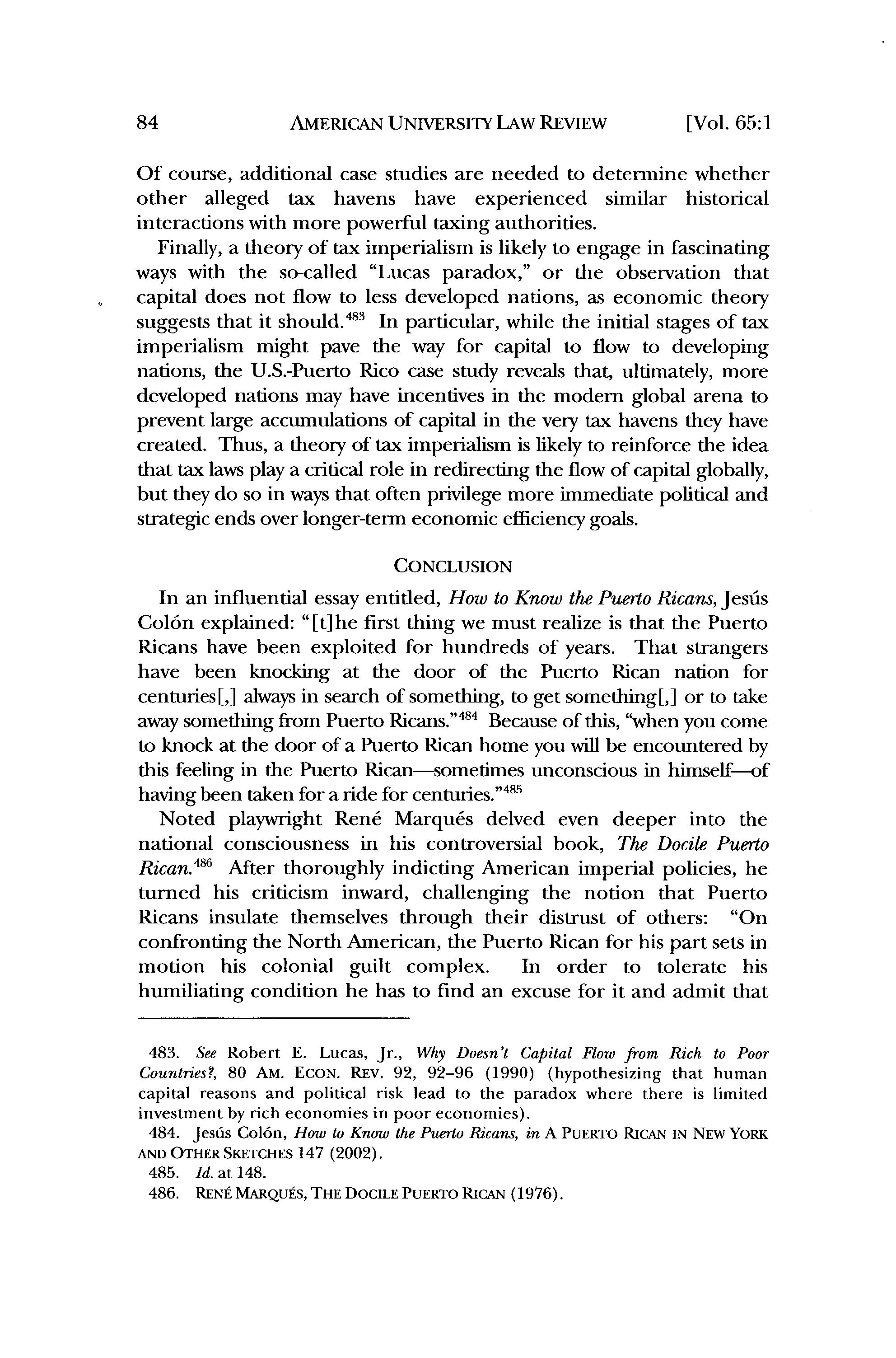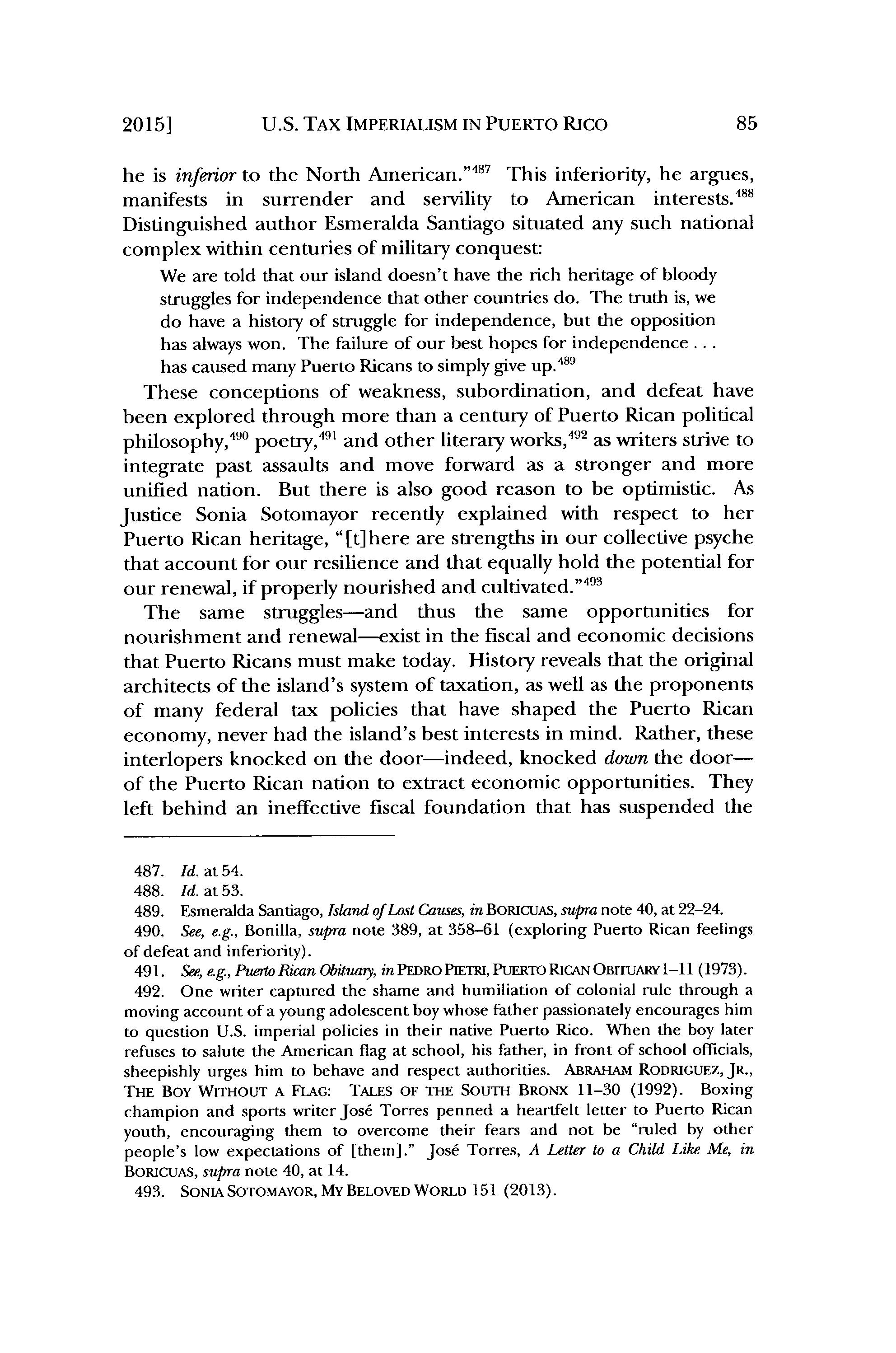
7 minute read
Conclusion
84
AMERICAN UNIVERSITY LAw REVIEW [Vol. 65:1
Of course, additional case studies are needed to determine whether other alleged tax havens have experienced similar historical interactions with more powerful taxing authorities.
Finally, a theory of tax imperialism is likely to engage in fascinating ways with the so-called "Lucas paradox," or the observation that capital does not flow to less developed nations, as economic theory suggests that it should."' In particular, while the initial stages of tax imperialism might pave the way for capital to flow to developing nations, the U.S.-Puerto Rico case study reveals that, ultimately, more developed nations may have incentives in the modem global arena to prevent large accumulations of capital in the very tax havens they have created. Thus, a theory of tax imperialism is likely to reinforce the idea that tax laws play a critical role in redirecting the flow of capital globally, but they do so in ways that often privilege more immediate political and strategic ends over longer-term economic efficiency goals.
CONCLUSION
In an influential essay entitled, How to Know the Puerto Ricans, Jestis Col6n explained: "l[t] he first thing we must realize is that the Puerto Ricans have been exploited for hundreds of years. That strangers have been knocking at the door of the Puerto Rican nation for centuries[,] always in search of something, to get something[,] or to take away something from Puerto Ricans.""' Because of this, "when you come to knock at the door of a Puerto Rican home you will be encountered by this feeling in the Puerto Rican-sometimes unconscious in himself-of having been taken for a ride for centuries.""
Noted playwright Rena Marques delved even deeper into the national consciousness in his controversial book, The Docile Puerto Rican."' After thoroughly indicting American imperial policies, he turned his criticism inward, challenging the notion that Puerto Ricans insulate themselves through their distrust of others: "On confronting the North American, the Puerto Rican for his part sets in motion his colonial guilt complex. In order to tolerate his humiliating condition he has to find an excuse for it and admit that
483. See Robert E. Lucas, Jr., Why Doesn't Capital Flow from Rich to Poor Countries?, 80 AM. EcoN. REv. 92, 92-96 (1990) (hypothesizing that human capital reasons and political risk lead to the paradox where there is limited investment by rich economies in poor economies). 484. Jesus Col6n, How to Know the Puerto Ricans, in A PUERTO RICAN IN NEW YORK AND OTHER SKETCHES 147 (2002). 485. Id. at 148. 486. RENE MARQUES, THE DOCILE PUERTO RICAN (1976).
2015]
U.S. TAx IMPERIALISM IN PUERTO RICO
85
he is inferior to the North American."" This inferiority, he argues, manifests in surrender and servility to American interests." Distinguished author Esmeralda Santiago situated any such national complex within centuries of military conquest:
We are told that our island doesn't have the rich heritage of bloody struggles for independence that other countries do. The truth is, we do have a history of struggle for independence, but the opposition has always won. The failure of our best hopes for independence ... has caused many Puerto Ricans to simply give up."
These conceptions of weakness, subordination, and defeat have been explored through more than a century of Puerto Rican political philosophy,"O poetry, ' and other literary works, 1 2 as writers strive to integrate past assaults and move forward as a stronger and more unified nation. But there is also good reason to be optimistic. As Justice Sonia Sotomayor recently explained with respect to her Puerto Rican heritage, "[t] here are strengths in our collective psyche that account for our resilience and that equally hold the potential for our renewal, if properly nourished and cultivated. "`
The same struggles-and thus the same opportunities for nourishment and renewal-exist in the fiscal and economic decisions that Puerto Ricans must make today. History reveals that the original architects of the island's system of taxation, as well as the proponents of many federal tax policies that have shaped the Puerto Rican economy, never had the island's best interests in mind. Rather, these interlopers knocked on the door-indeed, knocked down the doorof the Puerto Rican nation to extract economic opportunities. They left behind an ineffective fiscal foundation that has suspended the

487. Id. at 54. 488. Id. at 53. 489. Esmeralda Santiago, Island ofLost Causes, in BORICUAS, supra note 40, at 22-24. 490. See, e.g., Bonilla, supra note 389, at 358-61 (exploring Puerto Rican feelings of defeat and inferiority). 491. See, e.g., Puerto Rican Obituary, in PEDRO PIETRI, PUERTO RIcAN OBITUARY 1-11 (1973). 492. One writer captured the shame and humiliation of colonial rule through a moving account of a young adolescent boy whose father passionately encourages him to question U.S. imperial policies in their native Puerto Rico. When the boy later refuses to salute the American flag at school, his father, in front of school officials, sheepishly urges him to behave and respect authorities. ABRAHAM RODRIGUEZ, JR., THE Boy WITHOUT A FLAG: TALES OF THE SOUTH BRONx 11-30 (1992). Boxing champion and sports writer Jos6 Torres penned a heartfelt letter to Puerto Rican youth, encouraging them to overcome their fears and not be "ruled by other people's low expectations of [them]." Jos6 Torres, A Letter to a Child Like Me, in BORIcuAS, supra note 40, at 14. 493. SONIA SOTOMAYOR, My BELOVED WORLD 151 (2013).
86
AMERICAN UNIVERSITY ILAW REVIEw [Vol. 65:1

island in a perpetual state of dependence, ensuring that it remains docile and subservient to corporate interests that would exact an overwhelming toll on the island's economic development.
The Commonwealth has made important strides in recent years. Nevertheless, the most immediate and pressing issue facing the island continues to be that of economic self-determination and, in particular, fiscal self-sufficiency. A strong fiscal foundation is essential because, as French economist Thomas Piketty observed in his landmark work on wealth inequality, " [w] ithout taxes, society has no common destiny, and collective action is impossible.... At the heart of every major political upheaval lies a fiscal revolution."" Thus, the broader question remains: what is the path forward for Puerto Rico? In light of the history recounted here, answers are unlikely to be found in treatises narrowly focused on technical matters of tax policy and municipal finance. Nor will they be discovered through myopic fixation on the perennial question of statehood, independence, or preservation of the political status quo."' In striving to overcome its past, Puerto Rico must dig deeply within its national consciousness and continue to identify its social, political, and economic priorities, thereby constructing a fiscal architecture that best serves these ends.
This is no easy task, but the enduring works of the Puerto Rican writers, philosophers, poets, and other cherished public figures who have been cited throughout this Article-those who have carried and nurtured the island's heritage in the face of continual imperialist assaults-offer valuable words of wisdom. As poet Jos6 de Diegowidely regarded as the Father of the Puerto Rican Independence Movement-penned, "[d]o as the bull in the face of adversity: charge with confident power."9 6 This advice applies with equal force to the decisions Puerto Rico must make in regards to its fiscal policies going forward. There is much work to be done, but the future is hopeful.
494. PIKETrY, supra note 253, at 493. 495. Of course, there are important reasons for this "status-driven mindset." As one author recently explained, "[t]o speak of Puerto Rican political discourse is to speak about the question of status. No other topic comes close to its importance." Juan Pablo Carro, Deconstructing Sovereignty: The Validity of the Status-Driven Mindset as Seen Through Soberanias Exitosas: Seis Modelos Para el Desarrollo Econdmico de Puerto Rico by Angel Collado Schwarz, 80 REv.JUR. U. P.R. 439, 439 (2011) (footnote omitted). 496. Jos6 de Diego, To the Persecuted, in BORICUAS, supra note 40, at 7.
American University Law Review American University Law Review
Volume 65 Issue 1
2015
Diane Lourdes Dick Seattle University, dickdi@seattleu.edu Article 1
Follow this and additional works at: https://digitalcommons.wcl.american.edu/aulr
Part of the Tax Law Commons
Recommended Citation Recommended Citation Dick, Diane Lourdes (2015) "U.S. Tax Imperialism in Puerto Rico," American University Law Review: Vol. 65 : Iss. 1 , Article 1. Available at: https://digitalcommons.wcl.american.edu/aulr/vol65/iss1/1
This Article is brought to you for free and open access by the Washington College of Law Journals & Law Reviews at Digital Commons @ American University Washington College of Law. It has been accepted for inclusion in American University Law Review by an authorized editor of Digital Commons @ American University Washington College of Law. For more information, please contact kclay@wcl.american.edu.
This article is available in American University Law Review: https://digitalcommons.wcl.american.edu/aulr/vol65/ iss1/1




